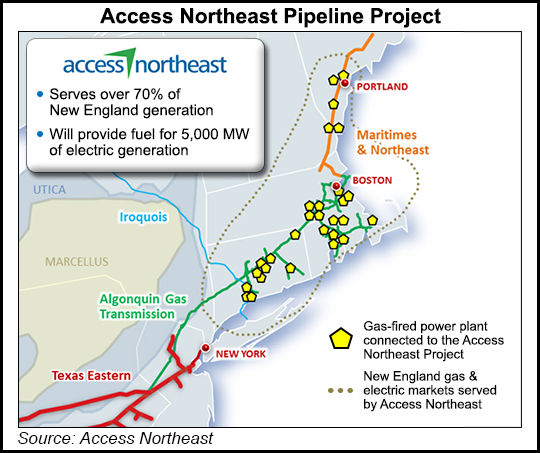Infrastructure | NGI All News Access | Regulatory
National Grid Rhode Island Pulls Access Northeast Regulatory Filing
National Grid’s Rhode Island electric utility last week pulled its state regulatory application to take capacity on the Access Northeast natural gas pipeline project.

The move “supports exploration of other options to get the project completed,” the company said, adding that it reserved the right to submit a revised filing in the future. National Grid was an early capacity taker on the project, but it needs regulatory approval to recover capacity costs from ratepayers. Spectra Energy’s Algonquin Gas Transmission LLC recently put the project on hold at the Federal Energy Regulatory Commission while it weighs commercial options.
Access Northeast has had mixed results at the state level. While Maine utility regulators agreed to join in a regional electric reliability effort that would have benefited Access Northeast, the Supreme Judicial Court of Massachusetts in August overturned a plan approved by that state’s regulators to proceed with the electric distribution company pipeline contracts. In October, New Hampshire regulators nixed a proposed contract between Eversource Energy and Access Northeast. Connecticut regulators subsequently dropped a request for proposals to add pipeline and storage capacity, as well as liquefied natural gas resources.
National Grid said it is still committed to the project.
“Our electric customers have literally been paying the price for major constraints on the network of pipelines that supply natural gas to the region’s power plants.” said Tim Horan, National Grid Rhode Island president. “These constraints have led to significant volatility in the cost of electricity and to our customers paying among the highest prices in the country.”
National Grid told the Rhode Island Public Utilities Commission that it is working with other New England electric and natural gas distribution companies on figuring out the next steps for the Access Northeast project and capacity contracting.
“We continue to believe that the Access Northeast project offers a solution to address the region’s natural gas constraints that will improve reliability and savings for customers primarily by upgrading existing infrastructure,” Horan said. “This project is critical to creating a balanced portfolio of energy solutions to get us to a clean energy future while ensuring customers continue to have access to affordable, safe, and reliable energy.”
© 2024 Natural Gas Intelligence. All rights reserved.
ISSN © 1532-1231 | ISSN © 2577-9877 |
